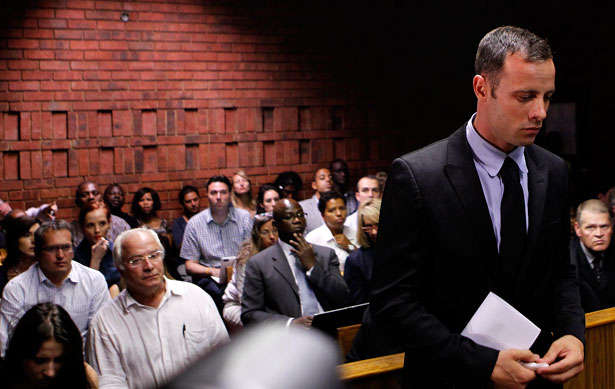
Oscar Pistorius stands in the dock during a break in court proceedings over the murder of girlfriend Reeva Steenkamp. (Reuters/Siphiwe Sibeko)
A professional athlete; a home with an arsenal of firearms; a dead young woman involved in a long-term relationship with her killer. In November, her name was Kasanda Perkins and the man who shot her was Kansas City Chiefs linebacker Jovan Belcher. Now her name is Reeva Steenkamp, killed by Olympic sprinter and double amputee Oscar “the Blade Runner” Pistorius. We don’t know whether Pistorius is guilty of murdering a woman he claims to have deeply loved or is guilty merely of being an unbelievably irresponsible gun owner, firing four bullets into the door of his bathroom in an effort to hit an imagined burglar. We do know that this is either an all-too-familiar story of a man and the woman he dated and then killed, or it’s the story of a man who thought a burglar had penetrated the electrified fence that surrounded his gated community to break into his house and use his toilet.
Just as with Belcher and Perkins, we will learn more than we ever wanted or needed to know in the weeks to come about the nature of Pistorius and Steenkamp’s relationship. We will learn about the “allegations of a domestic nature” that had brought police to his home in the past. We will learn about Pistorius’s previous allegedly violent relationships with women. We will learn about the variety of guns he kept at close hand. We will surely discuss male athletes and violence against women: the sort of all-too-common story that can create commonality between a football player from Long Island and a sprinter from Johannesburg. We might even ponder the way these gated communities, one of which was also the site of Florida teenager Trayvon Martin’s murder a year ago, become throbbing pods of paranoia and parabellums. We will learn about everything except what actually matters: there is a global epidemic of violence against women, and South Africa is at its epicenter.
Two days before Steenkamp’s death, there were protests outside of the South African parliament about the failures of the state to adjudicate the unsolved rapes and murders of women across the country. As the executive director of the Rape Crisis Centre Kathleen Dey said on February 12, “There are no overnight cures to the scourge of rape that is affecting South Africa. We have the highest instance of rape in the world and we cannot continue in this way.” The official statistics are shocking. Every seventeen seconds a woman is raped in South Africa yet just one out of nine women report it and only 14 percent of perpetrators are convicted. The Rape Crisis Centre and other organizations are starved for funds, with the demand for social services, counseling and even HIV tests far outstripping their capacity.
Popular
"swipe left below to view more authors"Swipe →
There have also had to be demonstrations against what the Women’s League of the African National Congress has termed “femicide.” In this country of 50 million people, three women a day are killed by their partners. When news of Steenkamp’s death became front-page news across the country, it pushed out ongoing headlines of the February 2 Western Cape gang rape and mutilation of a 17-year-old girl named Anene Booysen. Before her death, Booysen identified one of her perpetrators: it was someone she both trusted and knew.
This is hardly a South African problem, of course. We are confronting nothing less than a global system of brutal misogyny. Too many men across the world see too many women as repositories of their rage, frustration, narcissism or simply their will to enact violence. The World Health Organization’s reports that depending on the country, anywhere from “15% (Japan) to 71% (Ethiopia) of women report physical and/or sexual violence by an intimate partner at some point in their lives.” Like in South Africa, every statistic on this issue must be viewed with skepticism because of the transnational stigmas and shame that silence women who have survived.
In the United States, rape culture and the rape it produces have been normalized to the point where Notre Dame athletes accused of rape can take the field for a national championship football game without a peep from the sports pages. It’s a country where Fox News host Bob Beckel can ask incredulously, “When’s the last time you heard about rape on a college campus?” It’s a country, and a world, where people are now saying enough is enough.
It’s a global problem that will get solved only with a global response if we want to even dream of a world where violence against women is a relic of history. That’s the sentiment behind initiatives like “One Billion Rising to End Violence Against Women and Girls,” and this kind of brave solidarity and support is extremely welcome. This very solidarity was displayed by Reeva Steenkamp herself just before her death. Distraught over the murder of Anene Booysen, Steenkamp sent out an instragam message. It read, “I woke up in a happy safe home this morning. Not everyone did. Speak out against the rape of individuals in SA. RIP Anene Booysen.” Short of a billion of us rising, happy and safe homes will not be a reality for the women of the world. It should be. We have to act now unless we want to keep telling the stories of Kasandra Perkins, Anene Booysen and Reeva Steenkamp over and over again, only with different names.
Read Jessica Valenti’s take on the media’s double-standard for Pistorius and Steenkamp.


